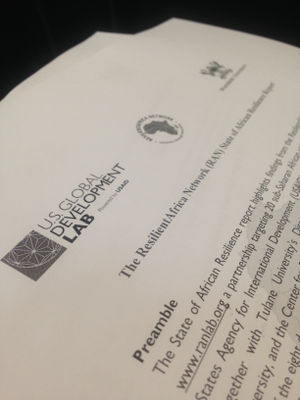Today researchers from Tulane University in New Orleans, Stanford University, the Center for Strategic and International Studies (CSIS), and the Disease Resilience Leadership Academy are working closely with a consortium of universities across Africa led by Makerere University to better understand the factors that make African communities resilient in the face of major challenges such as climate change, security, and diseases like HIV.
What they’ve learned has been summarized in the first State of African Resilience Report published by the Resilience Africa Network, a USAID initiative being led by Makerere University out of Kampala, Uganda, helping to better understand the factors that make a community resilient and inform development policy. Makerere and partners have created a formula for community resilience by identifying pathways to resilience and the innovations needed along this path to create appropriate community-driven solutions and policies to address some of the world’s most arduous problems.
Makerere University led a group of 20 universities across Africa as well as international research partners to better understand factors that make communities resilient against community challenges
This report offers a framework for designing innovations based on needs and policies defined by the community. Researchers led by Makerere University used new methods to understand resilience in a scientifically sound manner. It was little surprise to us that across all regions results showed that community partners consistently identified health and healthcare as a key factor to community resilience. In fact, this research was also able to identify the types of healthcare innovations that would most likely contribute to community resilience including those that:
- Address quality of care
- Create catalytic networks of health ecosystem players including providers, patients, and financers for better health, and
- Make diagnosis easier

Professor George Mondo Kagonyera, Chancellor Makerere University, address the audience at the State of African Resilience Report Launch
At IPIHD we are supporting and curating healthcare innovators in East Africa that address some of these pain points. LifeNet International works with faith-based clinics in Burundi and Uganda providing clinical and management training that increases the quality of care and capacity of clinics to treat patients. MicroClinic Technologiesdesigned a clinic management system, ZiDi, that allows clinics to engage with health ecosystem players such as payers/insurers, pharmaceutical companies, and drug distributors for pooled drug procurement. Afya Research Africa has created a network of 12 self-sustaining rural clinics across Kenya and Safe Water and AIDS Project (SWAP) created a rural health product distribution network in Kenya using community health promoters to deliver products and health education door-to-door. Finally, we are seeing a number of interesting easy-to-use diagnostic tools being developed by innovators in East Africa. Matibabu, a technology that allows care providers to accurately diagnose malaria without the need for blood samples or a laboratory, is one such example.
With so many relevant examples of healthcare innovation in East Africa, the IPIHD East Africa team will continue to attend and host events intended to bring together both IPIHD network and non-network healthcare innovators for increased peer-to-peer learning and knowledge exchange. For more information about upcoming events and how you can benefit from these learning opportunities, please contact Patricia Odero (patricia.odero@duke.edu) or Sylvia Sable (sylvia.sable@duke.edu).

